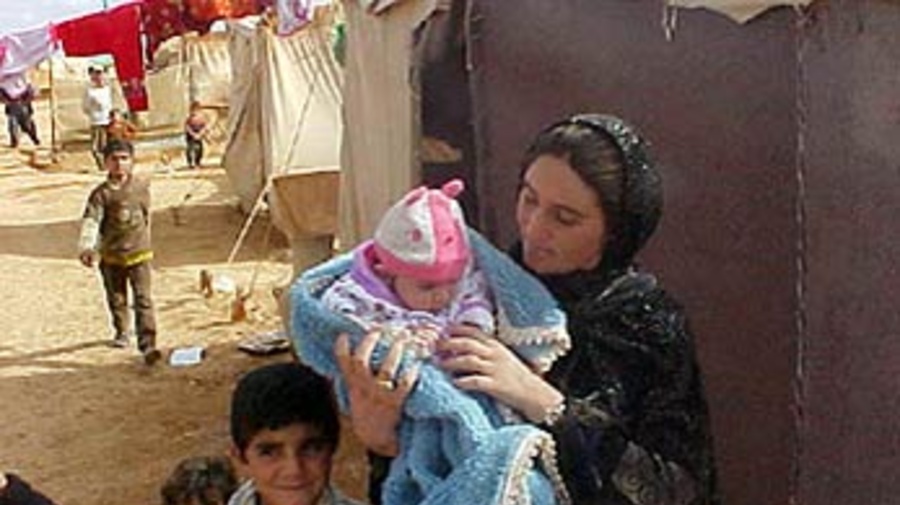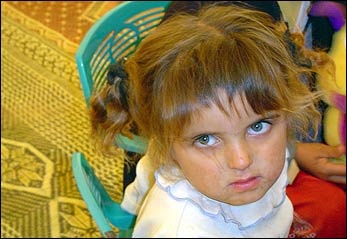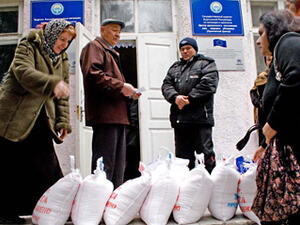Hopes and hardships in no man's land
Hopes and hardships in no man's land

Refugees living in windswept tents near the Jordan-Iraq border.
AMMAN, Jordan (UNHCR) - The recurrence of the age-old refugee problem and the sheer enormity of their numbers have dulled our sense of proportion. When you deal with millions of them - as in the case of Afghan refugees - a few hundred, a few thousand, tens of thousands can seem, by comparison, insignificant.
So when I was told that there are about 1,200 refugees in the no man's land on the border between Jordan and Iraq, I automatically thought, "Only 1,200, a very small caseload." This is the danger of being exposed, directly or indirectly through media reports, to recurring calamities of any kind - the tendency to become oblivious to the depth of individual pain and misery. Too often, the people and their lives disappear behind statistics and geographic locations.
Three hours' drive from the Jordanian capital Amman, the no man's land is a flat, barren, barb-wired piece of earth on the side of the extremely busy highway to Iraq. Hundreds of trucks packed with goods speed by day and night, polluting the air with heavy engine noise and worse. There is no sign of a single tree or any vegetation as far as the eye can see.
As we enter the tented grounds, the scattered aimless numbers, mainly men, head towards us with hesitant steps. Most of the people in the camp, over a thousand of them, are Iranian Kurds who left Iran for Iraq in the aftermath of the Islamic revolution in 1979, and during the Iran-Iraq war that started in the autumn of 1980 and lasted for eight years.
They lived in the Al Tash refugee camp, some 150 km west of Baghdad, with thousands of other Iranian Kurds until the Coalition war against Iraq in the spring of 2003, when more than a thousand of them managed to cross the Iraqi border into Jordan in hope of resettlement in another country. But they were not allowed to enter Jordanian territory and have since become stranded in the no man's land between the Iraqi-Jordanian border.
All of them without exception want to be resettled in a third, preferably western, country. The possibility of either going back to Iran or returning to camp life in Iraq is not an option they would consider. They say they belonged to various Kurdish political parties in Iran and their life would be in danger if they went home. Returning to Iraq's Al Tash camp, which sounds like a prison camp by their description, would also be out of the question.
They hang their hopes on every visitor to the camp - "This is my sister's telephone number; this is the name of the Australian member of parliament; this is my file number ... "
Unable to provide any answers or promises of any kind, I make the mistake of recommending patience to a crowd that has formed tightly around me. "Patience!" snaps a tall young man towering over me, his angry spit showering me like a cobra's venom. "Patience? I was only eight years old when I left Iran, that was 23 years ago, and I buried my childhood and youth in Al Tash camp."
He chokes on the anger and frustration as tears well up in the corners of his eyes. "It is death or deliverance, I can't endure yet another camp, I want a chance to live." The others add their voices in agreement.
Women express less anger, but as some of them detail their plight, tears and despair wash over their faces. The women's committee members are young and educated - they have their pens and notebooks and are taking notes of the meeting. One of them, a volunteer teacher at the camp, also takes part in the men's group meeting. She is young, good-looking and impressively composed. Her big dark eyes betray not a shred of the usual helplessness. There is no sign of hope on her face either, but the expression says, "I can deal with it, I'm strong."
"I got married here," she confides during a brief private chat. "We got engaged in Al Tash and got married here."
"Did you have a wedding?" I ask.
"No ... it doesn't ma...tter," she mutters, her composure collapsing. She fiddles with a silvery band on her finger - it's not a wedding ring but an ordinary metal ring that looks more like a tab from a Coke can. "We didn't get anything. He gave me this," she adds, her voice weak and broken, tears held steadfastly at bay.

Born in exile, will this Iranian Kurd girl have a future beyond no man's land?
The camp is to be moved further to the north, to the other side of the road to Iraq. This is mainly to protect the camp against flash floods from the higher grounds. The new site is on the side of the traffic coming from Iraq and going to faraway places. Watching the flow, the refugees may imagine travelling on those trucks, taxis and private cars to Jordan, beyond its borders, across rivers, seas and oceans, to freedom, to prosperity, to a normal life, to an ordinary life of an ordinary human being, to a future.
"Refugee" is not just a word, it is not just a number. It is a tragedy. It is a tale of hardship, humiliation, despair, and hope. The refugees in no man's land have not yet lost hope. Not yet, not yet.
By Solmaz Dabiri
UNHCR Jordan









